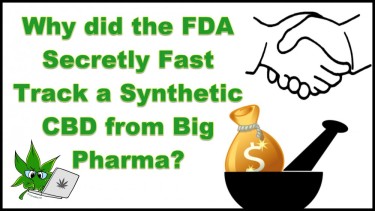
Natural vs. Synthetic CBD – wait a minute, what is synthetic CBD?
Cannabidiol (CBD), the non-psychoactive compound found in the cannabis and hemp plants, is more popular than ever.
Unlike the psychoactive tetrahydrocannabinol (THC), CBD offers a therapeutic alternative for people seeking relief from anxiety, insomnia, depression, stress, and inflammation without getting high. It’s commonly used in numerous different types of wellness products, ranging from oils to topicals to edibles and even beverages.
According to data from Statista, sales of CBD products reached around $5 billion in 2020. Meanwhile, CBD sales are expected to hit a whopping $17 billion by 2025. Their report also states that vitamins are the most popular segment of CBD products in convenience stores across America, while balms and lotions attracted the most interest. Despite CBD’s popularity, it’s still making inroads into the American market.
However, when people are buying CBD, especially for the first time, it is important to understand the type of ingredients you are consuming. Not all CBD products are created equal. So if you want to maximize the therapeutic effects of this powerful cannabinoid, knowledge is your best friend.
Synthetic CBD
Synthetic CBD is found in a few types of products.
As the name suggests, this type of CBD is synthesized in a lab. In most cases, they can use dangerous chemicals to create synthetic CBD like bromide or even fluoride. If you buy your cannabis on the street, from illegitimate dealers, and on the black market, these are places where you will most likely come across counterfeit and synthetic CBD.
Additionally, synthetic CBD is considered an active pharmaceutical ingredient (API) that is chemically identical to hemp-derived CBD, which is natural. It takes a crystalline powder form, similar to many CBD isolates sold on the market, and they are sometimes added to carrier oils. Other API products are pharmaceutical drugs that are regulated and designed to be stable for human consumption. However, there is no way to tell if the synthetic CBD you are consuming is safe; It will likely have some side effects just like other pharmaceutical drugs.
Be wary of synthetic CBD; better yet, avoid it. Synthetic cannabinoids, including CBD, can be dangerous and pose serious health risks, including increased heart rate, seizures, vomiting, and even death. Because they’re cheaper to produce and malicious merchants and manufacturers can make a quick buck selling synthetic CBD, there’s still widespread adoption of these products, requiring consumers to make an informed, data-driven choice. The FDA still hasn’t issued regulations to monitor the sale of CBD products, which is dangerous.
Some states ban the sale of synthetic CBD, but that hasn’t stopped illegal traders from selling it.
There are also a few reasons people fall for counterfeit CBD products: they are sold at extremely low prices, they advertise with big promises that they can treat all health conditions, and they have claims that they cannot be detected in drug tests. If you’ve tried CBD products that meet all of these conditions, you may have been fooled.
Natural CBD
What you want to consume is natural CBD, which is extracted from the hemp plant.
Natural CBD is made through a variety of processes that include oil and CO2 extraction, among others. Depending on the desired end product, CBD can be further processed to yield broad-spectrum or full-spectrum CBD, capsules, tinctures, topicals, or edibles. There are also CBD-rich strains that consumers can smoke or vape.
Aside from the health benefits already mentioned, many people consume CBD as a way to support general well-being and immunity. It can be taken daily in capsule form like the rest of your vitamins and supplements to help boost your immune system and fight oxidation and inflammation. Authentic, natural CBD is not only safe for daily use, but also the best way to make the most of its therapeutic benefits.
How to tell the difference
The best way to tell if the CBD you are consuming is natural or synthetic is to read the labels.
While there are some products that openly state that they use synthetic CBD, most do not. It’s not surprising that many synthetic CBD manufacturers try to obfuscate their product. Look for a Certificate of Analysis (COA), which is a test performed by independent third-party labs to verify ingredients and authenticity. Many well-known brands out there display a Certificate of Authenticity on their products, which consumers can access by simply scanning the QR code with their smartphone. Some retailers also display the COA on their websites. It is also good to note that since the FDA does not regulate CBD products, the presence of a COA is the best choice to determine the authenticity of the product.
You should also research the brand or company that sells the product before purchasing it. Also, look at the cannabinoid profile of the CBD product. An authentic broad-spectrum or full-spectrum CBD product would typically list other cannabinoids in its ingredients, including CBC, CBN, or CBDA.
In addition, reputable companies will provide you with information about the CBD product, e.g. B. where the hemp was grown and their website can give you details about the certification, processes and ingredients used to give their customers peace of mind. When it comes to CBD oils, many of them use a carrier oil that is acceptable, not necessarily a dubious ingredient.
Conclusion
We hope this information has equipped you with the knowledge you need to buy CBD products conscientiously. Remember, just because a product is sold as CBD doesn’t mean it’s actually real CBD: it’s important to do your homework.
MORE ABOUT SYNTHETIC CBD, READ THIS…

DOES THE FDA FAST-TRACK SYNTHETIC CBD FOR BIG PHARMA?

Post a comment: